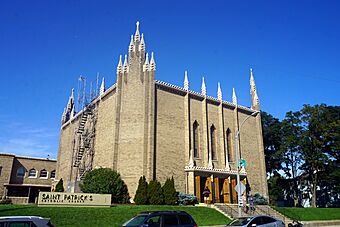St. Patrick's Roman Catholic Church (Racine, Wisconsin) facts for kids
Quick facts for kids |
|
|
St. Patrick's Roman Catholic Church
|
|
 |
|
| Location | 1100 Erie St. Racine, Wisconsin |
|---|---|
| Architect | Barry Byrne |
| Architectural style | eclectic |
| NRHP reference No. | 79000106 |
| Added to NRHP | July 5, 1979 |
St. Patrick's Roman Catholic Church is a historic church building in Racine, Wisconsin. It is a Catholic Church where people have gathered for many years. The church building was finished in 1925. It was added to the National Register of Historic Places in 1979. This means it is a very important building because of its special design.
Before the current church was built, the community used a different building. That first church was in the Greek Revival style. In 1923, the church leaders asked Barry Byrne to design a new building. Barry Byrne was a famous architect from Chicago. He had even worked with Frank Lloyd Wright, another very well-known architect. Byrne was good at designing churches and schools. St. Patrick's was only his second church design.
Contents
The Church's Unique Design
The St. Patrick's Church building was completed in 1924. It has a shape that is almost square. The corners of the building are cut off with short, angled walls. These walls have tall, pointed spires that reach up to the sky. The church walls are made of special wire-cut bricks. They also have very tall, narrow windows called lancet windows.
Outside the Church
The main entrance has three doors that are all the same size. Above these doors are beautiful decorations made of terracotta. There are also small spires and three windows above the entrance. Barry Byrne mixed different styles in his design. He used ideas from Gothic Revival style, like the tall, vertical lines and the lancet windows. He also added parts of Art Deco style, which you can see in the large, smooth wall areas. The building also has a modern feel, possibly from the Prairie School style.
Inside the Church
When you enter the church, you first step into a wooden area called a narthex. This area supports a balcony where the organ is located. The church has beautiful stained-glass windows. These windows show important figures like Old Testament prophets, the evangelists, and St. Patrick. You can also see the Stations of the Cross inside. There are also special carvings called bas-relief panels that show Mary and Joseph. Alphonzo Ianelli designed many of these beautiful decorations inside the church. He also worked with Frank Lloyd Wright.
Influence of the Design
The design of St. Patrick's Church was very new and exciting for its time. Barry Byrne's plans for the church were even shown at an art academy in Berlin, Germany. They were very influential there. Byrne later used a similar design for another church. This was the Church of Christ the King in Tulsa, which was built in 1926.
See also

